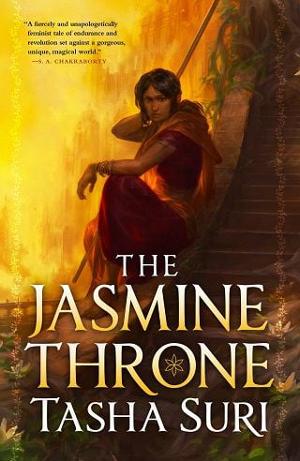Chapter 52: Malini
MALINI
They lay side by side on the bank of the rockpool, letting their saris dry out in the heat. There had been no rain, which was a relief. Just the day’s sunshine, and a faint breeze that mingled with the coolness of the water below them.
After all that Malini had been through—the burning of her heart sisters, her poisoning and imprisonment, her escape with Priya through a city aflame, and Priya’s near death—being here felt like a blessing. Kissing Priya in clear water, holding her arms, her warm skin—lying beside her here in the quiet warmth of sunlight—made Malini feel closer to happiness than she had been in a long time.
Maybe the foolishness of her decision to enter the water with Priya, to act on her want, would strike her later. But right now she felt no shame or regret. She wanted simple things: to savor this moment—stone digging into her hip and all—as long as she could. To have the time to memorize the shape and feel of Priya’s mouth, to learn her skin by blind touch. To laugh with her and talk with her and learn her, no pacts or painful debts between them.
“You know this doesn’t make you a monster,” Priya murmured. She lay facing Malini, sun on her deep brown skin, her hair a loose sheet of darkness around her. “Wanting me. You know that, don’t you?”
Malini wanted to explain that being monstrous wasn’t inherent, as Priya seemed to believe it to be. It was something placed upon you: a chain or a poison, bled into you by unkind hands.
But that wasn’t what Priya needed to hear.
“I know,” Malini said simply. “This part of me isn’t anything I’m ashamed of.”
She felt much greater shame at her own rage: the cold iron weight of it, ever present and ever steady in her heart. It shamed her, all the things she dreamt of doing to Chandra, but only because of how much pleasure the thought of his suffering brought her. He deserved to suffer. But to enjoy the thought of his pain made her more like him than she wanted to be.
“I think you may be a good person after all,” Priya said slowly.
“Oh?” Malini smiled. “You change your mind so swiftly?”
“Parts of you, then,” said Priya. “Parts of you want the world to be better. You want justice for yourself and the people you love, because your rights have been denied. You think the world owes you for that.”
“You need to work on your love talk, Priya,” Malini said dryly, and Priya laughed, a warm sound. “And I hope you realize you could be speaking about yourself, temple child.”
Priya shook her head. The laughter faded from the shape of her mouth, her eyes, as her expression turned contemplative.
“I’ve never wanted justice. Maybe I should have, but the thing I truly wanted was myself back. And now I just want to know—to prove—that the temple elders were wrong. Parijatdvipa was wrong. My brothers and sisters and I, we were never monsters. We didn’t deserve what was done to us. I want to believe that. I want to know that. I want that to be true, and if it isn’t, I want to make it true. But you, Malini,” she said. “You want to remake the world.”
“I just want to change who sits on the imperial throne,” Malini replied. But that didn’t feel entirely like the truth, even to her own ears.
Priya reached out, tracing Malini’s jaw with her fingertips. Priya was gazing at her with clear eyes and a furrow between her brows, reading her bones as if they were a map.
“This face. This face right in front of me. The face you’ve shown me, the fact that you kissed me. I know it. I know you,” said Priya. “I know exactly who you are. There are other versions of you that I don’t know. But this one…” Her fingers were against Malini’s lips. “This one is mine.”
For a moment, Malini felt as if maybe this was all that she was. There was nothing more to her, no princess of Parijat, no politician, no royal. She was just this, just herself, under Priya’s sure hand. Someone content.
She rolled over, placing distance between them. Priya drew her hand back, and perhaps she understood the gesture, because she rolled over onto her stomach, propping herself up on her elbows, no longer touching Malini. Instead, she lowered her gaze to Malini’s throat, where the cask of needle-flower hung on its chain.
“Do you have enough?”
Malini clasped her hand around the bottle. Its weight in her palm was heavy, the chain a cold shock of metal.
“I don’t need it anymore,” said Malini.
“Are you sure?”
“I have no physician to advise me, so no. Of course not. But I feel well enough now.” Well enough would have to do. She wouldn’t swallow needle-flower again unless she had no other choice.
“If you don’t need it any longer, why wear it?”
“You want me to discard it?”
“No,” said Priya. “But—I thought you would want to.”
“And you know me so well,” Malini said, without bite. She lowered her hand. “It’s a reminder.”
“Of what?”
She could have been flippant again. She could have denied Priya a true answer. But instead she said, “Of the price I’ve paid to see Chandra removed from his throne.”
“May I?” Priya asked.
Malini did not know what Priya planned to do. But she nodded regardless and said, “You may.”
Priya touched her fingertips to the bottle. A firm touch that pressed it against the cloth of Malini’s blouse. “A reminder,” Priya said softly.
The plants in the soil around them and the silt of the rockpool shivered. The air went still. There was a sound. A splintering.
The remnants of needle-flower essence had furled into new life, splitting through the bottle until it was in shards, falling to the ground. The flower was ugly, all points, and a deep black like a river on a moonless night.
Malini thought of the tale Priya had told her, of worship, of a hollowed coconut shell filled with a profusion of flowers as an offering of devotion to the yaksa and the dead. A thing frivolous. A thing of heart.
“It won’t die,” said Priya. “Not until I do, I think. It’s a memento but not… not only of loss.”
She lowered her hand, and Malini immediately raised her own, touching those needlelike black edges. They were strangely silken beneath her fingers. The flower was alive, despite the chain threaded through it, metal through bud—and she drew the chain so that the poison flower was hidden beneath her blouse, a strange weight on her skin.
“You’re terrifying,” Malini said. There was no fear in her, though. She almost wished the flower were sharp-edged so that she could feel the pain of it against her breast.
Priya snorted. “Hardly,” she said. And then, with endearing self-consciousness, she tucked her hair behind her ear and looked away. “We should keep moving.”
Priya knew more of Malini than she thought she did. And Malini was struck, absurdly, by how much she liked the woman Priya had made her be, however fleetingly.
I know you.
Priya stopped. Turned her head just slightly. She was close enough that Malini could see the tension in her shoulders. The flare of her nostrils, like an animal scenting the air. Priya rose abruptly to her feet.
“We need to go,” said Priya. “Quickly. As quickly as we can.”
“What is it?”
“The people we met at the mahal. The ones I fought. They’re here. I can feel them. Come on, Malini.”
Malini asked no more questions. She let Priya drag her to her feet. She followed Priya through the undergrowth, between the tall spears of the trees. And when Priya began to run, she did the same.
Sharp wood beneath her heels. The stinging snap of leaves and branches against her face, her arms, as sunlight blinked in and out of sight above them. Malini could hear nothing but the thud of her own heart, the ugly wheeze of her own breath in her ears. She wasn’t built for the business of running for her life.
“Don’t look!” Priya yelled. “Don’t look, just keep running—”
And Malini intended to follow Priya’s orders, she truly did. But something grasped at her ankle—a root she hadn’t seen perhaps, but it felt like something new, pushing through the soil, shoving her off-balance. She fell, and let out a gasp, and Priya caught her, and then they were both stumbling to a stop, surrounded by tall trees and ten figures in masks who slipped out from the shadows.
They were surrounded.
Priya turned, taking Malini by the arms, as if she wanted to push Malini behind her. But there was nowhere for Malini to hide, and no way for Priya to defend her from the circle of rebels, in their masks of dark wood. Priya’s hands tightened on Malini for a moment. Then she released her.
“Stay still,” said Priya. She raised one hand in the air.
The earth splintered, grass bending upon itself as thorns like spears shoved through the sod. Malini held herself perfectly still as they drove up through the ground around her feet—as the trees creaked, as if they were being drawn by some terrible gravity to bend toward the place where the rebels stood.
The rebels raised their own hands. Pushed Priya’s work down.
“That won’t work, Pri.” A man’s voice. Low, even. One of the rebels stepped forward. “We’ve all drunk from the vials today.” Eyes black, shadowed by the mask. “Put your hand down and come along obediently, hm? You’re wasting your energy. You have to see that.”
His words were echoed by the other rebels, with a susurration like wind through leaves. Obey. Obey.
Priya’s hand trembled. She opened it to the sky, the trees groaning dangerously. In response, the masked rebel tilted his head and a root forced its way from the ground, lashing tight around her wrist.
“I don’t want to hurt you,” he said. “But I will if I need to.”
“Ashok,” she said. “Let me go.”
“Kneel,” he said, and there was that whispered echo again. That chorus.
One of the thorns in the ground snapped. Ricocheted. With her free hand, Priya shoved Malini farther behind her. Priya made a noise that sounded as if she’d been punched, and then in the silence that followed, Malini saw a rivulet of blood snake down Priya’s hair, staining her neck and the back of her blouse.
Priya looked back wildly at Malini.
Malini was struck, in that moment, by their shared helplessness.
Then Priya turned away. Slowly, she kneeled.
The rebel took a step forward. For all his size, his footsteps were almost soundless upon the ground. He removed his mask, revealing a face that was all angles, brushed dark at the jaw by stubble. He did not look at Malini, or the other rebels. He seemed to see nothing but Priya.
“I don’t want to fight you,” he said.
“But you have,” she said. Her voice was strained, as if she were pushing against a great weight.
“I will die, Priya. All of us will die.” He kneeled down too. “Do you want that?”
“You know I don’t.”
“Then tell me the way,” he cajoled. “Show me. We can go together.” He held his hand out, palm open. “I’ve bested you. I’ve proved myself stronger. It’s only right.”
A sharp shake of Priya’s head.
“Will you really deny me my rights as your temple brother? You would deny me the chance to give Ahiranya the freedom it needs to survive?”
Of course. Of course he was a fellow temple child, Malini should have known. Should have pieced together the nature of this. But she didn’t move. She listened, and hoped there was an outcome from this better than all the dire ones that seemed to lie before them.
“Would I deny you the right to make us into exactly what the elders feared we’d become?” Malini could not see Priya’s face, but she could imagine what expression Priya wore: the bared teeth, the challenging set to her jaw. “I would.”
“You’re acting like a child,” he said. “You know what needs to be done. You know Ahiranya’s only chance is freedom from the emperor’s control and his ideology. Our only chance to be more than rot, degraded by Parijatdvipa’s idea of us, made smaller day by day, year by year—is this. The deathless waters. Their blood on our righteous hands. And yet you still refuse.”
“I’m not refusing,” snapped Priya. “But I won’t give it to you like this. Ashok, not like this. Not the way you want it.”
The man—the rebel, the temple son—named Ashok stood, drawing himself to his full height.
“Then how?” he asked, voice dangerously calm. “You want me to grovel, Priya? Maybe there will be time to make a world and a rule more like you want in the aftermath. But right now, you have a weapon you have no idea how to properly use. And it’s mine by right.”
“I want you to talk to me. I want you to use your reason. But you’ve backed yourself into a corner, haven’t you, Ashok? You’re killing everything you love. Yourself. Your followers. And you can’t see any way out but this.” Priya’s head was still bleeding freely, dripping onto the soil. “Maybe I should thank you after all for abandoning me. If I’d stayed with you, you’d be killing me too. At least now you’re only hurting me.”
“I told you. I have no desire to harm you.”
“Whatever you say,” Priya said, and Malini could hear the sneer in her voice, goading him.
Ashok’s face darkened.
Priya had moved a little in the time she’d spoken, carefully trying to angle her body in front of Malini’s. But finally—unfortunately—Ashok looked at her. He tilted his head, examining her.
“A lady of Parijat,” he said softly. “What should I make of this, Priya? Is she a hostage?” He took a step toward her. Looked her up and down, measuring her.
“Ashok,” Priya said. “No.”
“There are so many ways to hurt someone,” he said pleasantly. “Do you remember when Sanjana hit Nandi once, to make you give her something she wanted? What was it—a hairpin?”
“A bracelet,” Priya said thinly.
“She did it because she knew you wouldn’t give in if she hit you. But you cared too much about Nandi to watch him suffer. I’m sure the principle still applies.” A pause. “This is your last chance, Priya.”
Malini met his eyes. The glint of them. She knew a man who took pleasure in pain when she saw one, and this one did, whether he admitted his darkness to himself or not.
Priya turned her head, looking between Malini and Ashok not with fear, not with helplessness, but with a kind of mulish fury.
“I really hate you sometimes, Ashok,” Priya said in a low voice. “I swear it.”
A noise, like a splintering. The thorns unbowed their heads. Priya rose to her feet and flung herself onto her brother’s back, clawing his face like a cat. He swore and drove an elbow into her stomach. She made no noise—he must have winded her—and fell back hard against the ground.
The other rebels moved forward, but the ground rumbled, and split, kicking her back up into the air. She leapt onto her feet. Grabbed Malini’s arm, holding her, keeping her close, a manic light in her eyes.
“They need me,” Priya said, ragged. “Don’t worry. Stay near.”
There were hands, suddenly, against Malini’s throat, her shoulders—she twisted, furious, flinging a fist up without any sense of where it would land, and felt a burst of pain in her knuckles. Wood. The mask. She should have been more careful, but she was no warrior and did not know what to do.
Vines clambered up her arms, vicious spines digging into her attacker. And just to help things along, Priya threw a punch that knocked the mask askew. The rebel swore and let her go, and then Malini was upon the ground, and Priya was circling her, desperately outnumbered. Trying to keep her safe.
They were carrying weapons of wood, and this close Malini could feel the heat pouring off those weapons—a strange, immutable magic.
Think, she told herself. Think, think.
The heat was closer than it should have been. She looked down.
There was a dagger on the ground. It was made of wood, polished and honed to a sharp edge, and when she reached for it, it burned her fingers. She bit down on a curse and dropped it. Then she wrapped her pallu around her palm and grabbed it.
She thought of the lessons Alori had taught her. Of how to use a knife. Of how to gut or kill. The hollow concave of a heart. She thought of the fragility of her own flesh and bone, and how much she still had to accomplish.
Malini held the wood tight, adjusting to the burning warmth of it in her grip. She straightened. In her mind, she put aside the Malini she’d been beside the waterfall; put aside the woman she’d been for weeks on end, saved and seen by Priya’s eyes and hands and heart. She thought of pain, and how it could be leveraged, and the lessons your enemies can teach you, however unwitting.
She thought of her own ghost haunting her: a princess of Parijat, eyes cold.
She thought of Priya’s utter trust under her touch.
Malini rose up and darted against Priya’s back, clutching at her side. She could feel the stickiness of Priya’s blood—her own panicked heartbeat. She forced herself not to shake. Nothing good could come from an unsteady hand.
And then, without trembling, without hesitation, she placed the point of the knife beneath Priya’s ribs.
 Fullepub
Fullepub 



